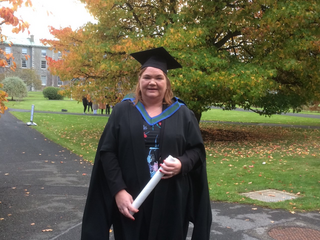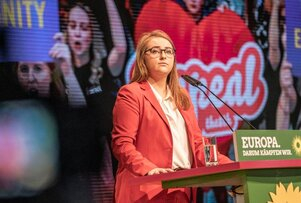See our flyers:
The Sociology degree is organised around three major strands, or different kinds of courses:
- Concepts and Theories: Courses introduce you to the most important concepts used by sociologists and to the main sociological theories.
- The Substance of Society: Courses examine major areas of sociological analysis and use sociology to explore the key features of historical and contemporary societies.
- Research Methods and Design: Courses introduce you to the logics of social research and the different methods used by sociologists to analyse the social worlds around them.
Each year of the Sociology degree emphasizes a crucial aspect of learning and doing Sociology:
- Year One theme: 'Critical Thinking and the Sociological Imagination'. Our goal for first year is to develop critical thinking by introducing you to key concepts and contributions in Sociology- both in Ireland and internationally.
- Year Two theme: 'Fundamentals of Sociology'. Our goal for second year is to provide students with the crucial elements of the ‘sociological toolbox’ including theories and methods.
- Year Three Theme: 'Doing Contemporary Sociology'. Our goal for third year is to continue developing your sociological imagination and skills, and to put them into practice through original social research in a thesis.
You may study Sociology through BA Arts or BSc in Social Science.
Wondering what sociology is all about? We have put together some information in our about us pages and we have a list of staff books available so you can see the issues we research and write about.
Well known sociologists? - Rev. Martin Luther King, Robin Williams, Michelle Obama and our own President Michael D. Higgins. For foundational and contemporary sociologists you might be reading during the course see here.
Who should I contact?
First Year Sociology
Your first point of contact is your tutor.
The first year coordinator is Dr. Mary Benson ([email protected]).
Second Year Sociology
If you are taking SO202, your first point of contact is your tutor.
The second year coordinator is Professor Seán Ó Riain ([email protected]) in Semester 1 and Dr Paul Ryan ([email protected]) in Semester 2.
See our flyers:
A key distinguishing feature of Politics at Maynooth is our focus on active citizenship. This includes, but goes beyond, the traditional study of parties and elections to include a much broader variety of aspects of politics (including public opinion, community activism, the media, NGOs, new social movements, trade unions etc.) and exploring the tensions between formal democracy, political power and social inequality. It also means providing opportunities for students to be active participants in their own learning on and off campus.
There are three interweaving strands:
- Political Sociology: Power, organisation and decision-making are central parts of the informal politics that underpins much of the everyday world. People have communities have very unequal access to power. We study how people contest power in society; from trade unions and business to residents’ associations and social movements.
- Formal politics: The study of formal political institutions is a core part of any politics course. The degree introduces the theory and practice of how institutions such as elections, political parties, governments or the European Union work
- International relations: We live in an increasingly globalised world characterised by increasing volatility, we study the theory of international relations, ethic conflict, war, development and regional specialisms including the Balkans and Latin America
We work to enhance the following core skills and values:
- Active citizenship: The degree introduces students to the theory and practice of active citizenship, encourages students to actively shape their own world and supports this various trips or events, a structured external experiential learning opportunities in all types of political organisations and a focus on teamwork and communication skills
- Political theory: The attempt to understand how the political world works and the debate over how it should work, raising questions of freedom, justice, how we should live and who should decide.
- Research methods: The core tools for researching politics, including survey or fieldwork research methods and a final-year dissertation, organised around an original, independent piece of political research.
Who should I contact?
First Year Politics
Your first point of contact is your tutor.
The first year coordinator is Professor Seán Ó Riain ([email protected]).
Second Year Politics
The second year coordinator is Dr Barry Cannon ([email protected]).
Third Year Politics
If you are taking PO303A (Special Topics), your first point of contact is your special topics group lecturer Nessa Ni Chasaide ([email protected]).
The third year coordinator is Dr Barry Cannon ([email protected]).
Please see our policy on extension requests for students here.
The purpose of the tutorial programme is to enable you to develop the skills needed to be a successful undergraduate sociology student. The first-year sociology coordinator for 2024/25 is Dr Mary Benson.
Specifically, the small tutorial groups, led by experienced tutors, create an active learning environment to better understand the type of reading and writing that are involved in becoming a competent user of the language of sociology. Critical reading skills go beyond memorizing the textbook and involve a selective reading of a wide variety of texts. Critical writing skills involve using evidence effectively, arguing successfully against other positions and placing your own original arguments in the context of what other people have already said on the subject at hand.
The tutorial program in first year consists of 16 workshop sessions for the year (8 each semester), delivered in small-group settings of about 20 students in each group. Each of these sessions is meant to give you a combination of skills delivery and a workshop element relating to your first year course assessments for SO152 Sociological Imagination and SO155 Sociological Concepts: Contemporary Irish Society.
In each session you will be presented with the chance to identify and start developing a specific skill in relation to an assignment (essay/exam) that you are working on for these courses. As such tutorials are a key component in both of these first year courses.
The tutorial sessions are NOT meant to be time for tutors to teach you the content of these two lecture courses. Instead, tutors will use examples from the content of the course to demonstrate certain sets of skills to you. As always, if you have content questions about the course, feel free to contact the first year lecturer directly.
In the end, attending tutorials, completing the assigned reading, participating and completing the assignments on time will give you the chance to improve your results.
Here you will find the Maynooth University Policy on Plagiarism and Academic Integrity.
The use of generative Artificial Intelligence (e.g. ChatGPT etc.) is strictly forbidden on all assignments, assessments, and academic work that you do within the department unless otherwise specified by your professor. To take credit for another person's or machine-generated words, writing and thoughts, and to present that as your own work, is plagiarism and will be subject to the policies of the university on plagiarism. The department reserves the right to ask students for an in-person meeting to account further for the assessment. Use of Artificial Intelligence in one module does not give permission for its use in any other assessment or modules.
Please also see the
Harvard Referencing Guide
Each year, third year students undertake a thesis project. It is a major piece of work and they meet weekly under the supervision of a member of staff.
With the permission of staff and students we also like to share some examples of the diversity and quality of student projects. Below are a selection of some of the undergraduate theses.
Special Topics from 2022-23
An analysis of gender inequality and intimidation towards women in gym environments
Aoife Sweeney
Supervisor: Professor Seán Ó Riain
What forms the basis of cross-community politics among the ‘peace generation’ in Northern Ireland? An exploration of the identities and politics of young Alliance Party supporters
Daniel Donovan
Supervisor: Professor Colin Coulter
How inclusive is the inclusive model of education in Ireland? A comparative study of absenteeism and attitudes towards school of children with Special educational needs and children without Special educational needs.
Lisa McCormack
Supervisor: Dr Delma Byrne
How are queer spaces in Dublin used, experienced and understood: A case study of Dance to the Underground in Fibber Magee’s.
Tara Egan
Supervisor: Dr Mary Benson
Abortion Activism and Feminism in the 21st Century
Supervisor: Nessa Ní Chasaide
Special Topics from 2021-22
Meat Consumption and Masculinity
By:
Stephanie Bartley
Supervisor: Professor Mary Corcoran
Can I tap: How passion shapes the experiences of Jiu-Jitsu athletes
By:
Steph Comiskey
Supervisor: Dr Joshua Moody
How do capital and habitus impact attitudes toward food and food practices?
By:
Adam Lynch
Supervisor: Professor Mary Corcoran
An examination into race relations at Maynooth University
By:
Aoife McDermott
Supervisor: Dr Pranav Kohli
Double jeopardy: Exploring how the Covid-19 Pandemic has impacted employment amoung young women with disabilities in the Irish labour market and their future career aspirations
By:
Suzy Mooney
Supervisor: Dr Nuala Whelan
How do the LGBTQ+ community view, understand and experience queer spaces: A case study of Street 66, Dublin
By:
Tara Swinburne
Supervisor: Dr Mary Benson
Special Topics from 2020-21
Water, Electricity...and High-Speed Internet? Exploring Issue Framing and Discourse in the National Broadband Plan, 2012-2019
By:
Warren Byrne
Supervisor: Professor Mary Murphy
The Paradox of Reality: you can be whatever you want within reason, an exploration of the relationship between gendered childhood activities and material culture to children’s future aspirations
By:
Hannah Gorman
Supervisor: Dr Delma Byrne
The Suspended Youth: How has COVID-19 affected the youth of Irelands employment and future job prospects post education?
By:
Joe Jennings
Supervisor: Dr Nuala Whelan
Exploring the use of food in constructing and expressing identity among immigrants in Ireland, and the impact of institutional food on the identity expression and integration of asylum seekers in the context of direct provision
By:
Danielle Keane
Supervisor: Professor Mary Corcoran
How is the Naas Community Men’s Shed understood, negotiated, and visualised by its members?
By:
Deirdre Moore
Supervisor: Dr Mary Benson
A Comparative Study of the experiences relating to childcare by lone parent mothers of African origin in Crumlin, Dublin South-Central and Mabelreign - a North-Western suburb in Harare, Zimbabwe
By:
Faomi Mothambazo
Supervisor: Dr Eoin Flaherty
Special Topics from 2019-20
What Shapes the attitude of young women living in Ireland today on the topic of Obesity?
By:
Amy Ruane
Supervisor: Dr Patrick Gallagher
An Exploratory Study of Women’s Experiences of Breastfeeding
By:
Gillian McGinley
Supervisor: Dr Pauline Cullen
Controlling and Containing Drug Users: How Societal Perspectives Serve in Maintaining the Biopolitical Nature of the Dominant Irish Harm Reduction Modality, Methadone Maintenance Treatment
By:
Andrea Eakin
Supervisor: Dr Richard Healy
Place Exploration: How is Brú na Bóinne, Co. Meath represented, visualised and understood?
By:
Paul Cahill
Supervisor: Dr Mary Benson
Understanding 21st Century Motherhood: Irish Mothers' Perceptions of their Maternal Bodies in the Context of Celebrity Culture
By:
Nadja Winter
Supervisor: Dr Paul Ryan
Testimonials & Achievements
Our students frequently tell us that taking Sociology and Politics has been ‘a life changing experience.’ Listen below to graduates of Maynooth Sociology and Politics share their experiences:
Sandra Norgrove
Sandra shares her experience as a mature student studying sociology at Maynooth University in this article titled
It'll all come together in the end
Seán O’Regan, BA Sociology and English, 2017
Gisele OConnell, BA Politics and Sociology, 2014
Abigail Shannon
The annual Undergraduate Research Symposium celebrates the diversity of undergraduate research activity across Maynooth University (MU), and presents a forum for the Summer Programme Undergraduate Research (SPUR) students from all faculties to showcase their research with peers and the wider University community.
Abigail Shannon, a third-year Arts student double-majoring in English and Sociology, was selected as a participant on the MU SPUR 2020 Programme under the Department of Sociology/MU Social Sciences Institute for her project, K-pop Fans on Twitter – Tracking East/West Flow of Popular Culture. On completion of the programme, the Faculty of Social Sciences highly commended Abigail’s project which was mentored by Dr. Rebecca King-O’Riain.
SPUR is an active research based and paid experiential learning programme for successful undergraduate students who wish to learn more about the postgraduate experience and possibly pursue a career in research. The programme is held for six weeks during the summer and affords students the opportunity to work closely with faculty mentors on research projects across a range of discipline. Further information on the MU SPUR Programme can be found on the Experiential Learning Office
website.
Majella Connolly
Majella Connolly, an adoptee from the St Patrick’s Mother and Baby Home in Dublin, was not afforded the opportunities to complete second-level education as an adolescent, nor to attend third-level education. It was later in life, after fighting and surviving an acquired brain injury, that Majella decided to return to education.
Following completion of her BA in 2017, Majella continued her studies at Maynooth and received a
Masters of Arts in Sociology in 2018. Her MA thesis, supervised by
Professor Mary Corcoran, was completed on how identity formation has been impacted by the experience of adoption. In her thesis, Majella succeeds in giving a voice to the adoptee to illuminate the consequences in their everyday lived lives of the structural and institutional forces that shaped the adoption process in Irish society.
In the Spring of 2019, Majella delivered a testimony at the Trinity College Dublin Educational Access Conference on what success at college means to her. More recently, Majella remains an active campaigner in the debate about the Mother and Baby Home records Bill and has appeared in several news reports and outlets including RTE News,
The Irish Independent and
The Irish Times.
Majella is much to be admired, having overcome so many hurdles in her life with great courage, strength, and stamina. Her story is a true inspiration to all.
Síona Cahill
Síona Cahill graduated from Maynooth University with a
BCL in Civil Law and Sociology in 2014. As a first-year undergraduate Sociology student, Síona won the McKevitt Memorial Prize for the best performance in the First Year Sociology Examination. The Longford native, is also the former Vice President of
Maynooth Students’ Union and, the former President of the
Union of Students in Ireland.
Throughout her studies and since graduating, Síona has remained an active campaigner, organiser and communications professional. She has led many campaigns on numerous social justice issues from, #MakeGráTheLaw (Ireland’s Marriage Equality referendum, 2015) to Students for Choice (Repeal of Ireland’s Eighth Amendment, 2018).
Síona was shortlisted alongside the internationally renowned Climate and Environmental Activist, Greta Thunberg, in the 'Women in Youth Activism' category of the
Women in Europe Awards for her work on civic participation and voter registration. She also received an
NXF GALA for her work on LGBTI+ awareness.
At the young age of 28, Síona has racked up a long list of impressive achievements and awards. She has been proactively involved in many equalities policy work as well as campaigning on different social inequality issues for numerous communities and marginalised groups. We are inspired by Siona’s passion for social justice and excited to see more of her exceptional work.
Inaugural year: The Justine Horgan memorial prize for best final year thesis project
Dr Justine Horgan, senior researcher in the National Advisory Committee on Drugs and Alcohol (NACDA), died in August 2013. Justine was a Health Research Board staff member seconded to the Department of Health and worked as prevalence expert at the Irish National Focal Point to the European Monitoring Centre for Drugs and Drug Addiction (EMCDDA). Justine completed her undergraduate education at NUIM in the 1990s and embarked on doctoral studies jointly between NUIM and the University of Groningen. She defended her doctorate at University of Groningen where she worked for a while before returning to Ireland in 2006. With the permission of Justine’s husband, Dr. Peter Muhlau, we have inaugurated a new prize for the best final year project submitted as part of the degree requirements in the Department of Sociology.
The recommendation of the externs was that the prize be jointly shared by Michael Naughton and Edward Sugden.
- Michael Naughton: Do former students of CSPE have a higher level of active and participatory citizenship that individuals who do not take CSPE? Naughton UG Thesis 2014
- Edward Sugden: Discourses around video games within newsprint media in the USA and Ireland between 2001 and 2014.
Raymond Payne
Raymond Payne, a third year student in Sociology and Politics, received a 'Bram Stoker' medal in Nov. 2013 for the best overall student on the island of Ireland in the Media and Arts category of the Undergraduate Awards 2013.
Raymond won the award for his second year Media and Society essay for Dr. Aphra Kerr in the Department of Sociology titled ‘From an Agora to a Trojan Horse: Potentials of a Public Sphere from the Traditional to the Virtual and Back Again.’ His work was chosen as the standout entry in its category, from 32 institutions on the island of Ireland.
His essay was one of almost 4,000 pieces of coursework submitted to The Undergraduate Awards from 182 third-level institutions internationally in 22 disciplines. Founded in Dublin in 2008, the Undergraduate Awards is a pan-discipline international awards programme. Winning and highly commended students came from Harvard, Princeton, the University of Hong Kong and Maynooth University in 2014. See .




